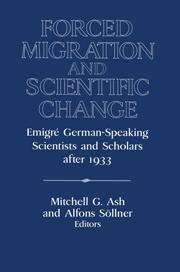Book contents
- Frontmatter
- Introduction: Forced Migration and Scientific Change after 1933
- PART ONE PHYSICAL AND MEDICAL SCIENCES
- 1 Identification of Emigration-Induced Scientific Change
- 2 Physics, Life, and Contingency: Born, Schrödinger, and Weyl in Exile
- 3 Emigration from Country and Discipline: The Journey of a German Physicist into American Photosynthesis Research
- 4 The Impact of German Medical Scientists on British Medicine: A Case Study of Oxford, 1933-45
- PART TWO PSYCHOLOGY, PSYCHONALYSIS, PEDAGOGY
- PART THREE SOCIAL SCIENCES
- Epilogue: The Refugee Scholar in America: The Case of Paul Tillich
- Index
2 - Physics, Life, and Contingency: Born, Schrödinger, and Weyl in Exile
Published online by Cambridge University Press: 05 January 2013
- Frontmatter
- Introduction: Forced Migration and Scientific Change after 1933
- PART ONE PHYSICAL AND MEDICAL SCIENCES
- 1 Identification of Emigration-Induced Scientific Change
- 2 Physics, Life, and Contingency: Born, Schrödinger, and Weyl in Exile
- 3 Emigration from Country and Discipline: The Journey of a German Physicist into American Photosynthesis Research
- 4 The Impact of German Medical Scientists on British Medicine: A Case Study of Oxford, 1933-45
- PART TWO PSYCHOLOGY, PSYCHONALYSIS, PEDAGOGY
- PART THREE SOCIAL SCIENCES
- Epilogue: The Refugee Scholar in America: The Case of Paul Tillich
- Index
Summary
In the fall of 1930 the Zurich mathematician Hermann Weyl returned to Göttingen as successor to David Hilbert. Soon thereafter he gave a speech in which he tried to explain to Göttingen students and rationalize to himself why he had chosen to come back to Germany after seventeen years at the Swiss Federal Institute of Technology in Zurich (Eidgenössische Technische Hochschule or ETH), where he had been content and productive. Weyl said:
I have returned, because I did not want to miss the contact with youth without which old age fades away into rigid loneliness, because I recognize that intellectual community is the proper site of scientific growth, and hence I acknowledge it as a serious duty to cultivate the tradition of science, and finally to embed myself again in the national community
[Volksgemeinschaft].Weyl not only wanted to get students to escape from the relative isolation of Zurich and to return to German culture, he also had to live up to his responsibilities as a member of the Göttingen thought collective and the elite of German science and try to wear Hilbert's mantle in a manner worthy of its previous owner. That he was expected to do so can be inferred from a letter in which Arnold Sommerfeld, one of the elder statesmen of theoretical physics in Germany, congratulated him on the appointment: “I am very pleased that you have decided to go to Göttingen. The opposite would have been a great disappointment to Hilbert.”
- Type
- Chapter
- Information
- Forced Migration and Scientific ChangeEmigré German-Speaking Scientists and Scholars after 1933, pp. 48 - 70Publisher: Cambridge University PressPrint publication year: 1996
- 3
- Cited by

